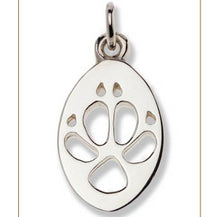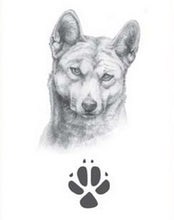Bushprints Dingo Silver Footprint Pendant
This inspirational dingo footprint pendant is made from 925 solid sterling silver. For Gary, the maker, quality is the prime consideration and all pieces are carefully hand-finished, giving a fantastic lustre. They are beautifully gift-boxed and in stock now. Weight: 24g in their own gift box.
Length 18 mm
Dingo facts:Dingoes cannot bark - but they can howl. Dingoes have unique wrists in the canine world, capable of rotation. This enables them to use their paws like hands and turn door knobs. Their ability to go where other dogs can't means dingoes can cause more problems for humans than other wild members of the dog family can. Most Australian dingoes are ginger-coloured or sandy-coloured with white chests. There are also dark-coloured dingoes. Wild dingoes can live for up to ten years but usually live for more like five or six years. Dingoes cared for by people can live up to 15 years or more
Domestication of dingoes has been difficult. Dingoes are intelligent animals. They are more independent and harder to train than other dogs. Dingoes have larger canine teeth than domestic dogs. Wild Australian dingoes kill and eat prey ranging in size from small lizards, birds and rodents up to sheep and kangaroos. They will also scavenge carrion. The days of the pure dingo may be numbered. Dingoes are increasingly mating with feral domestic dogs. Some of the genetically purest dingoes live on Fraser Island in Queensland. Evidence has emerged recently of pure dingoes living close to Sydney. And we find them on our remote cameras at Rocklily. Research at Sydney's University of New South Wales indicates dingoes may be the world's oldest breed of dog. Dingoes breed once a year and produce one litter of pups each year. Australian dingoes mate in autumn. Dingoes' gestation period is two months. Dingo litter sizes range between one and ten pups. The average number of pups born is five or six. The dominant female dingo kills any pups born to other females in a dingo pack. Pack members help care for the pups of the dominant dingo pair. At around 8 weeks old, pups are weaned onto solid food, often consisting of regurgitated meat.




